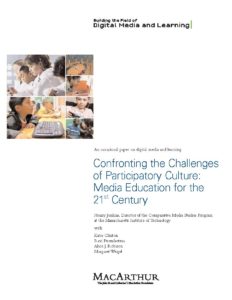Author: Henry Jenkins
Summary: This resource challenges teachers and schools to have conversations about the social skills, technological access, and cultural competencies involved in a connected-learning approach to learning and literacy. Written by Henry Jenkins and members of Project New Media Literacies, it describes “new literacies” that rely on collaboration and networking, and argues that schools have been slow to develop pedagogies that support youth in participatory culture, with its potential benefits of “peer-to-peer learning, a changed attitude toward intellectual property, the diversification of cultural expression, the development of skills valued in the modern workplace, and a more empowered conception of citizenship.” Without school involvement, Jenkins argues, groups of students will be left behind in developing the new skills and competencies needed to succeed “as full participants in our society.” For teacher leaders who want to offer ideas and help their colleagues understand and embrace participatory culture in school settings, this resource is a place to begin the conversation.
Original Date of Publication: 2006
How can educators best understand the impact that Internet technologies are having on today’s youth and use that understanding to inform their teaching practices?

Download “Confronting the Challenges of Participatory Culture: Media Education for the 21st Century”
In his report Confronting the Challenges of Participatory Culture: Media Education for the 21st Century (PDF), funded by the John D. and Katherine T. MacArthur Foundation’s digital media and learning initiative, author Henry Jenkins identifies an Internet culture of participation that defines the lives of youth today.
Jenkins identifies the following skills as critical for literacy in a new media culture:
- Play—the capacity to experiment with one’s surroundings as a form of problem-solving
- Performance—the ability to adopt alternative identities for the purpose of improvisation and discovery
- Simulation—the ability to interpret and construct dynamic models of real-world processes
- Appropriation—the ability to meaningfully sample and remix media content
- Multitasking—the ability to scan one’s environment and shift focus as needed to salient details
- Distributed Cognition—the ability to interact meaningfully with tools that expand mental capacities
- Collective Intelligence—the ability to pool knowledge and compare notes with others toward a common goal
- Judgment—the ability to evaluate the reliability and credibility of different information sources
- Transmedia Navigation—the ability to follow the flow of stories and information across multiple modalities
- Networking—the ability to search for, synthesize, and disseminate information
- Negotiation—the ability to travel across diverse communities, discerning and respecting multiple perspectives, and grasping and following alternative norms.
Related Resources
- Reading in a Participatory Culture (NWP Radio)
- On Becoming Change Writers
- A “Connected-Learning” Style and Fashion Program for Adolescents Leads to Career Opportunity
- Teaching in the Connected Learning Classroom
- No Longer a Luxury: Digital Literacy Can’t Wait
Original Source: National Writing Project, https://www.nwp.org/cs/public/print/resource/2713